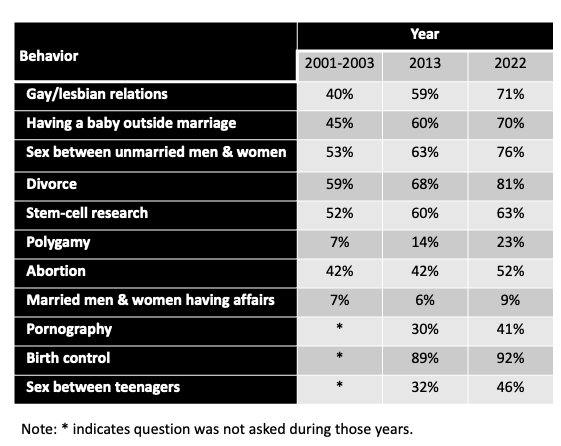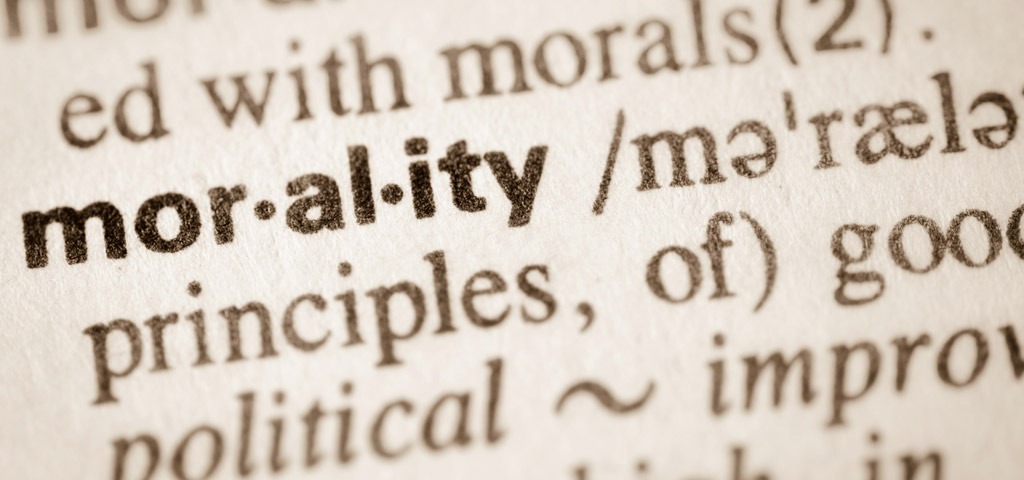Views on Sexual Morality in the United States in 2022
July 4, 2022 by Justin Lehmiller
According to Gallup’s 2022 Moral Issues Survey, American adults’ views on sexual morality have become more liberal since the turn of the century. In fact, for some of the issues on this survey, Gallup recorded the most liberal views on record–an interesting paradox in a time when politicians and judges are increasingly legislating morality and restricting sexual and reproductive rights.
Among the more sizable changes are that Americans now appear to be overwhelmingly comfortable with same-sex relationships, contraception, sex between unmarried adults, divorce, and having children outside of marriage. The moral acceptability of abortion appears to have increased significantly as well, but not by as wide of a margin. However, Americans’ attitudes toward other sex-related issues—such as infidelity—have remained quite stable.
Check out the table below for a closer look at the numbers and how they have changed over the last two decades. Note that Gallup started asking about most of these topics in 2001-2003; however, they added more issues to the list around 2013 (including pornography and birth control), which is why I put that year in the table as a reference point.
Percentage of Americans Who Think Each Behavior Is Morally Acceptable (Gallup, 2022)

As you can see, the most dramatic change to occur is that a large majority of Americans now believe that gay and lesbian sexual relations are morally acceptable. Public opinion on this issue has shifted in a major way since 2001. Back then, most Americans believed that same-sex behavior was immoral; however, that has notably changed alongside the important social and political gains made by the LGBTQ+ community in recent years, including the fact that same-sex marriage is now legal throughout the nation due to a Supreme Court decision in 2015. At least one Justice now believes that ruling (as well as the 2004 ruling that granted a right to engage in private sexual acts) should be revisited; however, these poll results indicate that overturning those rights would be completely out of step with most Americans’ views.
Sex between unmarried men and women and divorce were rated as the most morally acceptable behaviors in 2001, and they continue to lead today. By contrast, both consensual non-monogamy (specifically, polygamy) and non-consensual non-monogamy (cheating) are the least accepted.
However, it is interesting to note that the number of Americans who think polygamy is morally acceptable has more than tripled over the last 20 years. It would be interesting to know whether moral acceptance of other forms of consensual non-monogamy—by which I mean polyamory, open relationships, and swinging—has changed over this same time period. However, Gallup has not inquired about the acceptability of these relationship configurations in their surveys, which means we can’t really say what, if any, changes have occurred. I would certainly hypothesize that their perceived acceptability has likely increased as well (especially in light of how interest in open relationships has surged over time), but we need more data to know for sure.
In light of the recent Supreme Court decision overturning Roe v. Wade which guaranteed a right to abortion, it is important to point out that the moral acceptability of abortion has increased ten percentage points over the last two decades and now has majority support. Other surveys have found that most Americans further believe abortion should be legal; however, attitudes toward abortion and the law are complex and highly nuanced.
As for the additional issues asked about in 2013, we can see that there have been some significant shifts in the moral acceptability of porn use and sex between teenagers; however, most Americans appear to find these issues morally unacceptable, which is interesting considering how common these behaviors are—most people have sex as teenagers and most people use porn at some point. By contrast, use of birth control is almost universally perceived as morally acceptable, with 9 in 10 Americans saying so.
With all of that said, it is important to highlight that while Americans’ sexual attitudes overall are increasingly liberal, the numbers in the table above points to a substantial minority that supports conservative sexual values. This cultural divide is regional, with attitudes being more liberal in the northeast and west, and more conservative in the south. The partisan divide is greatest on LGBTQ+ and abortion issues, with more than 40 percentage points separating liberals and conservatives in their attitudes. All of this helps to explain why sexual morality issues are much more controversial in some states than others—and aren’t going to go away. And as public opinion becomes increasingly liberal while government action moves in the opposite direction, the controversy will only magnify from here.
Want to learn more about Sex and Psychology? Click here for more from the blog or here to listen to the podcast. Follow Sex and Psychology on Facebook, Twitter (@JustinLehmiller), or Reddit to receive updates. You can also follow Dr. Lehmiller on YouTube and Instagram.

Dr. Justin Lehmiller
Founder & Owner of Sex and PsychologyDr. Justin Lehmiller is a social psychologist and Research Fellow at The Kinsey Institute. He runs the Sex and Psychology blog and podcast and is author of the popular book Tell Me What You Want. Dr. Lehmiller is an award-winning educator, and a prolific researcher who has published more than 50 academic works.
Read full bio >


